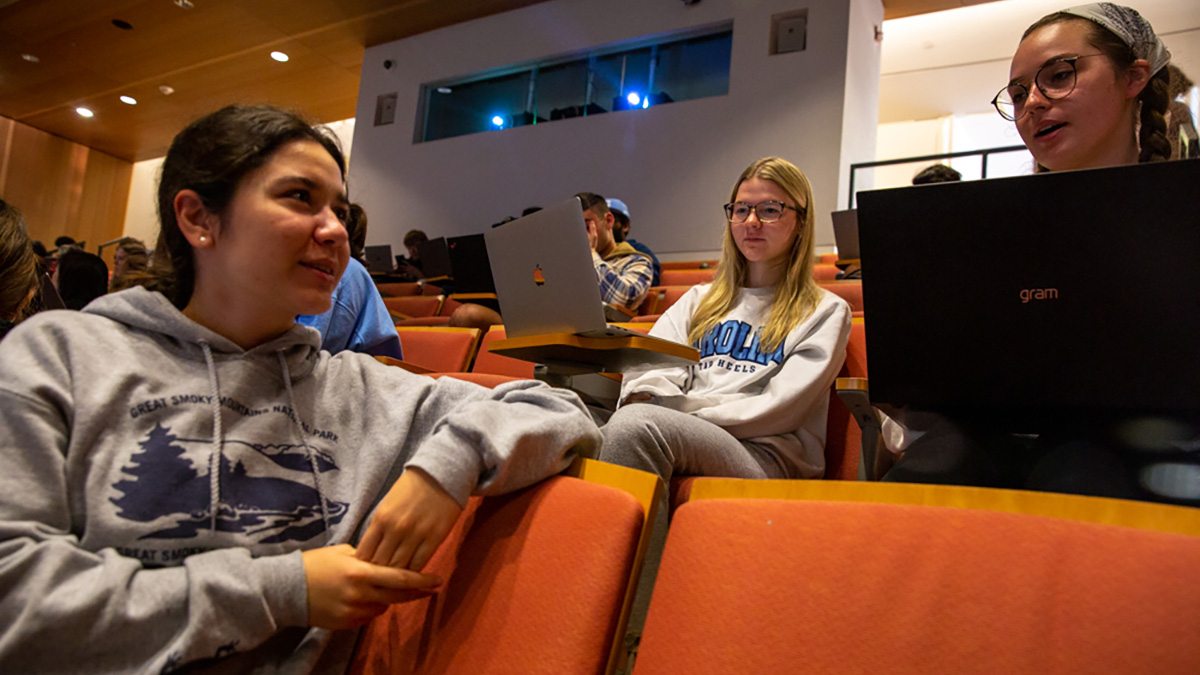Fake news, real science
A collaborative course led by faculty in the College of Arts and Sciences, the Hussman School of Journalism and Media and the School of Education focuses on science literacy for both the creators and consumers of media.

How can consumers evaluate the accuracy of science information in media? What factors can influence how media frame and build narratives around science information?
Students learn to ask those questions — and find their answers — in an innovative interdisciplinary course at Carolina designed for first-year students. “IDST 118: Fake News, Real Science” focuses on science literacy for both the creators and consumers of media.
UNC Hussman School of Journalism and Media Associate Professor Deen Freelon is one of three professors teaching the course that attracts students from across disciplines at Carolina.
“Science has become increasingly politicized,” said Freelon, whose research often examines mis- and disinformation. “Understanding the different ways media outlets can frame a story, at times for partisan purposes, is important.”
UNC School of Education Professor Troy Sadler and Department of Earth, Marine and Environmental Sciences Teaching Associate Professor Megan Plenge join Freelon and combine their expertise to provide deep insights for their 300-plus students. Freelon, Sadler and Plenge coordinate to ensure complementary lesson plans as they alternate weeks lecturing in class.
The class is one of the Triple-I (Ideas, Information, and Inquiry) courses in Carolina’s IDEAs in ActionGeneral Education curriculum — a set of special courses and experiences designed for first-year students.
Becoming thoughtful and savvy media consumers is important not only for first-year college students but for people throughout their lives, especially in matters of science, Plenge said. Plenge created the “IDST 118” course in 2019 after seeing students in her other courses struggle to reconcile facts from science articles with information they learned outside of class.
“Socio-scientific issues such as climate change are so relevant to everyday life — conversations about them influence laws and policies which affect us all,” she said. “However, in communicating about science topics, there’s this translation from science to media to consumer. All these translations can lead to news consumers misunderstanding critical issues.”
To help with that translation, Freelon teaches students the SIFT method with the steps they can take to help determine the validity and reliability of claims and sources of media content. SIFT stands for:
STOP.
INVESTIGATE the source.
FINDbetter coverage.
TRACE claims, quotes and media to the original context.
“The class provides an opportunity for me to learn from my other colleagues on campus,” said Sadler, whose research focuses on how students learn to understand complex social and scientific issues.
Sophomore Isa Makhuli said her interest in the STEM fields and journalism prompted her to take the course. She also appreciated learning from a team of professors.
“I enjoy having three professors as it allows us to get an insight into three different areas of study in one class and learn how education, journalism and science can be connected in the media we see in the world today,” Makhuli said. A big lesson she’s learned from the class: how many fake news sites are created about topics — their purpose not to objectively report but to promote a certain opinion.
While the principles taught about media literacy are consistent, the course is adaptive and can explore case studies with topical issues like COVID-19 and climate change. Regardless of the subject matter in each semester, the core teachings of careful discernment and questioning study remain the same, Plenge said.
“I think it’s important that learners have a chance to make sense of complex issues,” Sadler said. “The issues that we’re focusing on in this course are absolutely critical and the source of a lot of controversy in our society.”
As Freelon puts it: “A university education is about teaching students to ask questions and think for themselves about issues like science that affect the entirety of their lives — this course helps them do that.”




